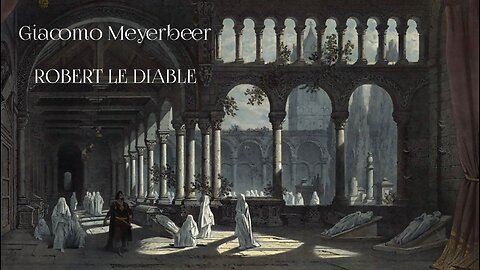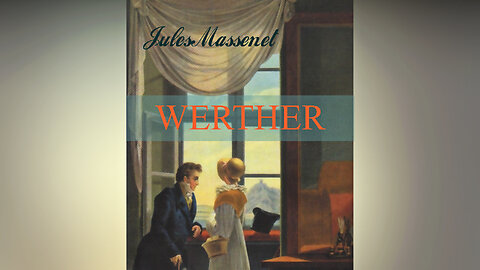
French Opera
3 videos
Updated 8 months ago
French Composers
-
Meyerbeer: Robert le Diable | Blake, Ramey, Anderson, Lagrange - Fulton (Opéra de Paris 1985)
 Adaneth - Arts & LiteratureOpera Title: Robert le Diable (Robert the Devil) Composer: Giacomo Meyerbeer Librettist: Eugène Scribe, and Germain Delavigne Premiere: 21 November 1831, Paris (Opéra) Language: French Subtitles: English Synopsis: https://en.wikipedia.org/wiki/Robert_le_diable#Synopsis Performers: Robert - Rockwell Blake Alice - Michèle Lagrange Isabelle - June Anderson Bertram - Samuel Ramey Raimbaut - Walter Donati Albert - Jean-Philippe Marlière Opéra National de Paris Conductor: Thomas Fulton Rec. 1985 Robert le diable (Robert the Devil) is an opera in five acts composed by Giacomo Meyerbeer between 1827 and 1831, to a libretto written in French by Eugène Scribe and Germain Delavigne. Robert le diable is regarded as one of the first grand operas at the Paris Opéra. It has only a superficial connection to the medieval legend of Robert the Devil. Originally planned as a three-act opéra comique, "Meyerbeer persuaded Scribe to change (the opera)...to a five-act grand opera". The dramatic music, harmony and orchestration of Robert, its melodramatic plot, and its sensational stage effects (especially the Ballet of the Nuns) made it an overnight success and instantly confirmed Meyerbeer as the leading opera composer of his age. Robert initiated the European fame of its composer, consolidated the fame of its librettist, Scribe, and launched the reputation of the new director of the Opéra, Louis-Désiré Véron, as a purveyor of a new genre of opera. It also had influence on development of the ballet, and was frequently mentioned and discussed in contemporary French literature. Robert continued as a favourite in opera houses all over the world throughout the nineteenth century. After a period of neglect, it began to be revived towards the end of the twentieth century.71 views
Adaneth - Arts & LiteratureOpera Title: Robert le Diable (Robert the Devil) Composer: Giacomo Meyerbeer Librettist: Eugène Scribe, and Germain Delavigne Premiere: 21 November 1831, Paris (Opéra) Language: French Subtitles: English Synopsis: https://en.wikipedia.org/wiki/Robert_le_diable#Synopsis Performers: Robert - Rockwell Blake Alice - Michèle Lagrange Isabelle - June Anderson Bertram - Samuel Ramey Raimbaut - Walter Donati Albert - Jean-Philippe Marlière Opéra National de Paris Conductor: Thomas Fulton Rec. 1985 Robert le diable (Robert the Devil) is an opera in five acts composed by Giacomo Meyerbeer between 1827 and 1831, to a libretto written in French by Eugène Scribe and Germain Delavigne. Robert le diable is regarded as one of the first grand operas at the Paris Opéra. It has only a superficial connection to the medieval legend of Robert the Devil. Originally planned as a three-act opéra comique, "Meyerbeer persuaded Scribe to change (the opera)...to a five-act grand opera". The dramatic music, harmony and orchestration of Robert, its melodramatic plot, and its sensational stage effects (especially the Ballet of the Nuns) made it an overnight success and instantly confirmed Meyerbeer as the leading opera composer of his age. Robert initiated the European fame of its composer, consolidated the fame of its librettist, Scribe, and launched the reputation of the new director of the Opéra, Louis-Désiré Véron, as a purveyor of a new genre of opera. It also had influence on development of the ballet, and was frequently mentioned and discussed in contemporary French literature. Robert continued as a favourite in opera houses all over the world throughout the nineteenth century. After a period of neglect, it began to be revived towards the end of the twentieth century.71 views -
Carmen - Bizet | Vickers, Freni, Bumbry, Karajan (Wiener Philharmonkier 1967)
 Adaneth - Arts & LiteratureComposer: Georges Bizet Librettist: Henri Meilhac, and Ludovic Halévy Premiere: 3 March 1875, Paris (Opéra Comique) Language: French Subtitles: English Artists: Grace Bumbry, Jon Vickers, Justino Díaz, Mirella Freni, Olivera Miljakovic Directors: Herbert von Karajan Mariemma & Ballet de Espana Set Design: Teo Otto Costume Design: Georges Wakhevitch Carmen Synopsis ACT I A square in Seville, with a guardhouse and cigarette factory Micaela looks for Don José, but he will not be there till the guard is changed. Urchins mock the soldiers at the changing of the guard. The girls from the cigarette factory mingle with the soldiers, but Carmen remains aloof: she can only love one who flees, not one who loves her. Since Don José is ignoring her, she flings a flower in his face and runs off. He hides it inside his tunic as Micaela returns, bringing a letter from his mother and a kiss, which he returns. There is a disturbance in the factory, Carmen has stabbed another girl and Zuniga orders Don José to take her to prison, but she bewitches him into letting her escape. ACT II The tavern of Lillas Pastia Carmen rejects the advances of Zuniga. She is waiting for Don José, who is about to be released from prison (he had been demoted and imprisoned for letting her escape). She also seems unimpressed by the toreador Escamillo, who makes advances to her. As all leave except Carmen and her gypsy friends, Zuniga promises to return, despite her discouragement. She refuses to join the smugglers because she is in love. Hearing Don José's voice, she tells the others to leave. He is jealous when he learns that she has danced for the officers, so she dances for him, but is interrupted by the bugle sounding the retreat. When Don José insists that he must return to barracks she accuses him of not loving her. He produces the faded flower, telling her it has stayed with him through his imprisonment. If he loves her, she says, he will follow her to the mountains, but he is still resolved to leave. He is still there when Zuniga returns and disobeys Zuniga's order to leave. They come to blows and are separated by the smugglers. Don José now has no choice but to desert and join the smugglers. ACT III A pass high in the mountains The smugglers make camp. Don José regrets his present way of life, particularly as Carmen is disenchanted with him. As Mercédès and Frasquita lightheartedly tell their fortunes, Carmen consults the cards and reads her death in them. Don José is left on guard as the girls go down to beguile the customs officers while the men take the goods through. Micaela has come in search of Don José. She hides. Escamillo has come in search of Carmen and is discovered by Don José. They fight, and only the return of the smugglers saves Escamillo, as Carmen restrains Don José. Micaela is discovered. She has brought Don José a message from his dying mother and Carmen scornfully tells him to go. He swears that he will return. ACT IV Outside the bullring in Seville Escamillo arrives for the bullfight, accompanied by Carmen. Warned by her friends that Don José is looking for her, she refuses to beware, but waits outside to confront him. As she continues to resist his entreaties and threats, he kills her as the crowd acclaims the victorious Escamillo. Having killed his beloved Carmen, Don José surrenders to the law.202 views
Adaneth - Arts & LiteratureComposer: Georges Bizet Librettist: Henri Meilhac, and Ludovic Halévy Premiere: 3 March 1875, Paris (Opéra Comique) Language: French Subtitles: English Artists: Grace Bumbry, Jon Vickers, Justino Díaz, Mirella Freni, Olivera Miljakovic Directors: Herbert von Karajan Mariemma & Ballet de Espana Set Design: Teo Otto Costume Design: Georges Wakhevitch Carmen Synopsis ACT I A square in Seville, with a guardhouse and cigarette factory Micaela looks for Don José, but he will not be there till the guard is changed. Urchins mock the soldiers at the changing of the guard. The girls from the cigarette factory mingle with the soldiers, but Carmen remains aloof: she can only love one who flees, not one who loves her. Since Don José is ignoring her, she flings a flower in his face and runs off. He hides it inside his tunic as Micaela returns, bringing a letter from his mother and a kiss, which he returns. There is a disturbance in the factory, Carmen has stabbed another girl and Zuniga orders Don José to take her to prison, but she bewitches him into letting her escape. ACT II The tavern of Lillas Pastia Carmen rejects the advances of Zuniga. She is waiting for Don José, who is about to be released from prison (he had been demoted and imprisoned for letting her escape). She also seems unimpressed by the toreador Escamillo, who makes advances to her. As all leave except Carmen and her gypsy friends, Zuniga promises to return, despite her discouragement. She refuses to join the smugglers because she is in love. Hearing Don José's voice, she tells the others to leave. He is jealous when he learns that she has danced for the officers, so she dances for him, but is interrupted by the bugle sounding the retreat. When Don José insists that he must return to barracks she accuses him of not loving her. He produces the faded flower, telling her it has stayed with him through his imprisonment. If he loves her, she says, he will follow her to the mountains, but he is still resolved to leave. He is still there when Zuniga returns and disobeys Zuniga's order to leave. They come to blows and are separated by the smugglers. Don José now has no choice but to desert and join the smugglers. ACT III A pass high in the mountains The smugglers make camp. Don José regrets his present way of life, particularly as Carmen is disenchanted with him. As Mercédès and Frasquita lightheartedly tell their fortunes, Carmen consults the cards and reads her death in them. Don José is left on guard as the girls go down to beguile the customs officers while the men take the goods through. Micaela has come in search of Don José. She hides. Escamillo has come in search of Carmen and is discovered by Don José. They fight, and only the return of the smugglers saves Escamillo, as Carmen restrains Don José. Micaela is discovered. She has brought Don José a message from his dying mother and Carmen scornfully tells him to go. He swears that he will return. ACT IV Outside the bullring in Seville Escamillo arrives for the bullfight, accompanied by Carmen. Warned by her friends that Don José is looking for her, she refuses to beware, but waits outside to confront him. As she continues to resist his entreaties and threats, he kills her as the crowd acclaims the victorious Escamillo. Having killed his beloved Carmen, Don José surrenders to the law.202 views -
Massenet: Werther | Peter Dvorsky, Brigitte Fassbaender - Petr Weigl (Opera Film 1985)
 Adaneth - Arts & LiteratureComposer: Jules Massenet Librettist: Edouard Blau, and Paul Milliet and Georges Hartmann Premiere: 16 February 1892, Imperial Theatre Hofoper (Vienna) Language: French Translation: English Subtitles Werther Synopsis: https://www.opera-arias.com/massenet/werther/synopsis/ Werther is an opera in four acts by Jules Massenet to a French libretto by Édouard Blau, Paul Milliet and Georges Hartmann based on the German epistolary novel The Sorrows of Young Werther by Johann Wolfgang von Goethe. Aged 24 at the time, Goethe finished Werther in five and a half weeks of intensive writing in January to March 1774. It instantly placed him among the foremost international literary celebrities and was among the best known of his works. The novel is made up of biographical and auto-biographical facts in relation to two triangular relationships and one individual: Goethe, Christian Kestner, and Charlotte Buff (who married Kestner); Goethe, Peter Anton Brentano, Maximiliane von La Roche (who married Brentano), and Karl Wilhelm Jerusalem, who died by suicide on the night of Oct 29 or 30, 1772. He shot himself in the head with a pistol borrowed from Kestner. The novel was adapted as the opera Werther by Jules Massenet in 1892. Although Massenet wrote and completed his opera in 1887, it did not receive any performance until it premiered at the Imperial Theatre Hofoper in Vienna on February 16, 1892, in a German version translated by Max Kalbeck. It had a great success and it rappidly confirmed Jules Massenet's position on the French opera scene. It achieved enormous popularity outside France, notably in Italy, America and England. The French-language premiere followed in Geneva on December 27, 1892, and the first performance in France was at the Opéra-Comique, Paris on January 16, 1893. The tragic story takes place in Wetzlar, Germany, within the period July to December, in an undefined year in the 1780s. It tells of Werther's intense passion for Charlotte, whom he falls hopelesly in love with at first sight. Charlotte instead marries his best friend, Albert, fulfilling a pledge to her now deceased mother. From a self-imposed exile, Werther pens letters that kindle Charlotte's feelings. When Werther comes to her, she is torn between her love and her duty, but finally sends him away forever. For his part, Albert is aware of the emotions at play around the trio, but is powerless to stop the inevitable outcome. When Charlotte discovers that Werther means to end his life, she rushes to his side and pours out her true heart to him as he expires. This film production was shot on location in and out Prague and was directed by the distinguished Czech director, Petr Weigl, twice winner of the Prix Italia, and director of the internationally acclaimed films, including Pas de quatre, Labyrinth der Macht, and Romeo and Juliet, all of which received international awards. Cast & Characters Werther - Peter Dvorsky Charlotte - Brigitte Fassbaender Sophie - Magda Vášáryová (vocals by Magdaléna Hajóssyová) Albert - Michal Dočolomanský (vicals by Hans Helm) Le Bailli - František Zvarík (vocals by Peter Mikulás) Johann - Pavel Kühn Schmidt - Miroslav Kopp Brühlmann - Lubomir Vraspir Kätchen - Vera Cerna Prague Radio Symphony Orchestra Bambini di Praga Chorus Conductor: Libor Pesek Director: Petr Weigl134 views
Adaneth - Arts & LiteratureComposer: Jules Massenet Librettist: Edouard Blau, and Paul Milliet and Georges Hartmann Premiere: 16 February 1892, Imperial Theatre Hofoper (Vienna) Language: French Translation: English Subtitles Werther Synopsis: https://www.opera-arias.com/massenet/werther/synopsis/ Werther is an opera in four acts by Jules Massenet to a French libretto by Édouard Blau, Paul Milliet and Georges Hartmann based on the German epistolary novel The Sorrows of Young Werther by Johann Wolfgang von Goethe. Aged 24 at the time, Goethe finished Werther in five and a half weeks of intensive writing in January to March 1774. It instantly placed him among the foremost international literary celebrities and was among the best known of his works. The novel is made up of biographical and auto-biographical facts in relation to two triangular relationships and one individual: Goethe, Christian Kestner, and Charlotte Buff (who married Kestner); Goethe, Peter Anton Brentano, Maximiliane von La Roche (who married Brentano), and Karl Wilhelm Jerusalem, who died by suicide on the night of Oct 29 or 30, 1772. He shot himself in the head with a pistol borrowed from Kestner. The novel was adapted as the opera Werther by Jules Massenet in 1892. Although Massenet wrote and completed his opera in 1887, it did not receive any performance until it premiered at the Imperial Theatre Hofoper in Vienna on February 16, 1892, in a German version translated by Max Kalbeck. It had a great success and it rappidly confirmed Jules Massenet's position on the French opera scene. It achieved enormous popularity outside France, notably in Italy, America and England. The French-language premiere followed in Geneva on December 27, 1892, and the first performance in France was at the Opéra-Comique, Paris on January 16, 1893. The tragic story takes place in Wetzlar, Germany, within the period July to December, in an undefined year in the 1780s. It tells of Werther's intense passion for Charlotte, whom he falls hopelesly in love with at first sight. Charlotte instead marries his best friend, Albert, fulfilling a pledge to her now deceased mother. From a self-imposed exile, Werther pens letters that kindle Charlotte's feelings. When Werther comes to her, she is torn between her love and her duty, but finally sends him away forever. For his part, Albert is aware of the emotions at play around the trio, but is powerless to stop the inevitable outcome. When Charlotte discovers that Werther means to end his life, she rushes to his side and pours out her true heart to him as he expires. This film production was shot on location in and out Prague and was directed by the distinguished Czech director, Petr Weigl, twice winner of the Prix Italia, and director of the internationally acclaimed films, including Pas de quatre, Labyrinth der Macht, and Romeo and Juliet, all of which received international awards. Cast & Characters Werther - Peter Dvorsky Charlotte - Brigitte Fassbaender Sophie - Magda Vášáryová (vocals by Magdaléna Hajóssyová) Albert - Michal Dočolomanský (vicals by Hans Helm) Le Bailli - František Zvarík (vocals by Peter Mikulás) Johann - Pavel Kühn Schmidt - Miroslav Kopp Brühlmann - Lubomir Vraspir Kätchen - Vera Cerna Prague Radio Symphony Orchestra Bambini di Praga Chorus Conductor: Libor Pesek Director: Petr Weigl134 views

